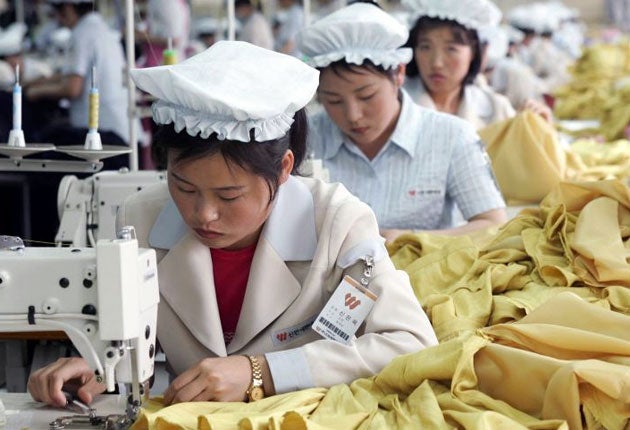Pyongyang puts squeeze on enemy
South Korean firms operating north of the border face huge bills

Your support helps us to tell the story
From reproductive rights to climate change to Big Tech, The Independent is on the ground when the story is developing. Whether it's investigating the financials of Elon Musk's pro-Trump PAC or producing our latest documentary, 'The A Word', which shines a light on the American women fighting for reproductive rights, we know how important it is to parse out the facts from the messaging.
At such a critical moment in US history, we need reporters on the ground. Your donation allows us to keep sending journalists to speak to both sides of the story.
The Independent is trusted by Americans across the entire political spectrum. And unlike many other quality news outlets, we choose not to lock Americans out of our reporting and analysis with paywalls. We believe quality journalism should be available to everyone, paid for by those who can afford it.
Your support makes all the difference.North Korea stoked tensions with the West over its nuclear programme yesterday by demanding a 3,000 per cent increase in rent and a four-fold pay rise for its workers at a North-South Korean industrial park on the border.
Since it started operating four years ago, Kaesong, the industrial estate, has been held up as an example of how the two once-deadly rivals on each side of the border dividing the Korean peninsula can work together. But now it has been dragged into the maelstrom over North Korea's test of nuclear weapons last month and its growing defiance in the face of international censure.
While the North was expected to negotiate for higher wages and rent, the scale of the demand still came as a surprise. The country's official news agency blamed "big profits whereas the north side has not received payments at a proper level as far as land use tax, wages for workers... and tax on the zone, etc are concerned."
Kaesong is 10km (six miles) north of the Demilitarised Zone (DMZ) and is about an hour's drive from Seoul, a reminder of just how close South Korea is to its increasingly belligerent neighbour. There are more than 70 South Korean companies operating in the industrial zone, employing 30,000 workers and providing a steady flow of hard currency for the impoverished communist state. The North has received $16m (£9.6m) for 50 years' use of the site, but is now demanding $500m. Workers there earn about $70 a month.
Tensions between the North and South over the past few years mean Kaesong is not the most stable of investment opportunities. Last month, the North Korean government abolished all deals on wages, rent and fees paid there.
Negotiations were also stymied by South Korean demands for the release of a man who was detained at the complex for criticising the North's regime.
With tensions at their highest on the peninsula since the 1950-53 Korean War, the UN Security Council could sign off as early as today on a draft resolution expanding sanctions on the country. They would affect its weapons exports, a major revenue source.
In retaliation, the Pyongyang government has implemented a ban on British citizens entering North Korea. It says the move was in response to a claimed ban on North Koreans entering Britain. But Koryo Tours, a tour group which organises visits to North Korea, said it was probably a reference to the UN sanctions.
"We have not been given any indication of how long this travel restriction will last and as yet the only people affected are UK citizens," the group said in a statement. About 300 Britons visit North Korea every year. There have been negotiations to come up with a workable UN resolution since a nuclear test in May brought the secretive regime closer to a working nuclear device. North Korea's response to the proposals has been increasingly defiant.
The proposed UN resolution is aimed at preventing North Korea from advancing its nuclear programme. The sanctions allow for inspections of suspect cargo, a provision that is sure to anger the North Koreans. It also calls on the North to halt its weapons programme and resume negotiations.
Join our commenting forum
Join thought-provoking conversations, follow other Independent readers and see their replies
Comments